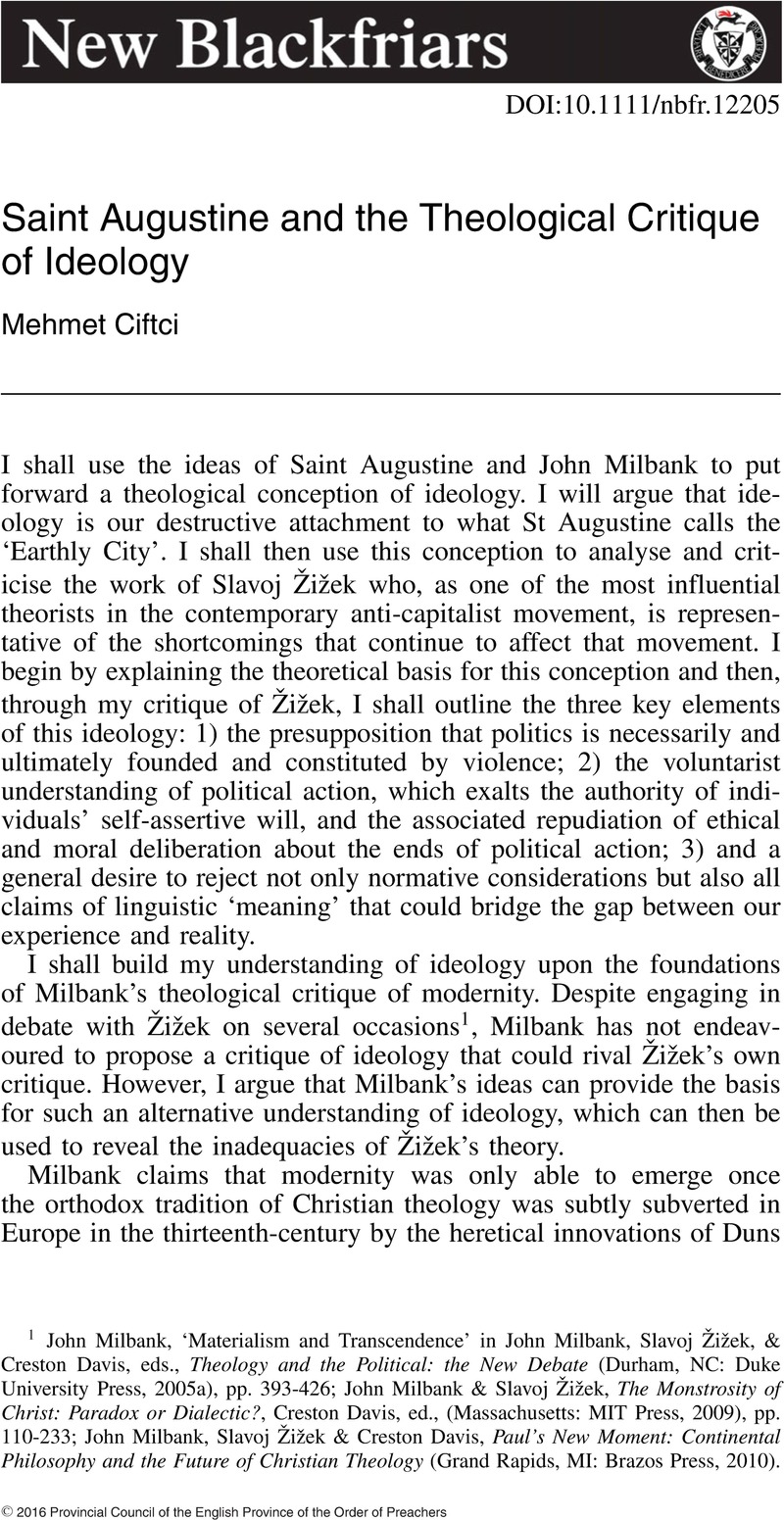No CrossRef data available.
Article contents
Saint Augustine and the Theological Critique of Ideology
Published online by Cambridge University Press: 01 January 2024
Abstract

- Type
- Original Article
- Information
- Copyright
- Copyright © 2016 Provincial Council of the English Province of the Order of Preachers
References
1 Milbank, John, ‘Materialism and Transcendence’ in Milbank, John, Žižek, Slavoj, & Davis, Creston, eds., Theology and the Political: the New Debate (Durham, NC: Duke University Press, 2005a), pp. 393‐426CrossRefGoogle Scholar; Milbank, John & Žižek, Slavoj, The Monstrosity of Christ: Paradox or Dialectic?, Davis, Creston, ed., (Massachusetts: MIT Press, 2009), pp. 110‐233Google Scholar; Milbank, John, Žižek, Slavoj & Davis, Creston, Paul's New Moment: Continental Philosophy and the Future of Christian Theology (Grand Rapids, MI: Brazos Press, 2010)Google Scholar.
2 Milbank, John, ‘Knowledge: The Theological Critique of Philosophy in Hamann and Jacobi’ in Milbank, John, Pickstock, Catherine, & Ward, Graham, eds., Radical Orthodoxy: A New Theology (London: Routledge, 1999), pp. 23‐24CrossRefGoogle Scholar.
3 Oliver, Simon, ‘Introducing Radical Orthodoxy: from participation to late modernity’ in Milbank, John, & Oliver, Simon, eds., The Radical Orthodoxy Reader (London: Routledge, 2009), p. 17Google Scholar.
4 Ibid, p. 18.
5 Milbank, John, Theology and Social Theory: Beyond Secular Reason (Oxford: Blackwell Publishing, 2006, 2nd Edition), p. 9CrossRefGoogle Scholar.
6 Milbank, John, Pickstock, Catherine, & Ward, Graham, ‘Introduction’ in idem, eds., Radical Orthodoxy: A New Theology (London: Routledge, 1999), p. 3CrossRefGoogle Scholar.
7 Oliver, 2009, p. 7.
8 Ibid.
9 Milbank, John, ‘The Invocation of Clio: A Response’, The Journal of Religious Ethics, vol. 33, no. 1 (2005b), p. 4CrossRefGoogle Scholar.
10 Ibid.
11 Oliver, 2009, p. 7.
12 Ibid.
13 Ibid.
14 Hobbes, Thomas, Leviathan, Tuck, Richard, ed., (Cambridge: Cambridge University Press, 1996), p. 95Google Scholar.
15 Ibid, p. 75.
16 Milbank, John, ‘Political Theology and the New Science of Politics’ in Milbank, John & Oliver, Simon, eds., The Radical Orthodoxy Reader (London: Routledge, 2009), p. 183Google Scholar.
17 Milbank, John, ‘The Gift of Ruling: Secularization and Political Authority‘, New Blackfriars, vol. 85 no. 996 (2004), p. 215CrossRefGoogle Scholar; Manent, Pierre, An Intellectual History of Liberalism, Balinski, Rebecca, trans., (Princeton, NJ: Princeton University Press, 1995), pp 10‐20Google Scholar.
18 Milbank, 2006, p. 442.
19 Ibid, p. 4.
20 Weithman, Paul, ‘Augustine's political philosophy’ in Stump, Eleonore, & Kretzmann, Norman, eds., The Cambridge Companion to Augustine (Cambridge: Cambridge University Press, 2001), p. 236Google Scholar.
21 Ibid.
22 Ibid, emphasis added.
23 Ibid, p. 235.
24 Ibid, p. 237.
25 Williams, Rowan, ‘Introduction’ in Milbank, John, Žižek, Slavoj, & Davis, Creston, eds., Theology and the Political: the New Debate (Durham, NC: Duke University Press, 2005), p. 1Google Scholar.
26 Žižek, Slavoj, The Sublime Object of Ideology (London: Verso, 1989), p. 28Google Scholar.
27 Weithman, 2001, p. 235.
28 Marx, Karl, The Communist Manifesto (Middesex: Penguin Books, 1967), p. 79Google Scholar.
29 Žižek, Slavoj, Living in the End Times (London: Verso, 2010), p. 201Google Scholar.
30 Laclau, Ernesto & Mouffe, Chantal, Hegemony and Socialist Strategy: Towards a Radical Democratic Politics (London: Verso, 2001, 2nd ed), pp. 95‐96Google Scholar.
31 Žižek, 2010, p. 198.
32 Ibid, p. 201.
33 Ibid, p. 198.
34 Ibid, p. 136.
35 Milbank, 2005b, p. 4.
36 Joseph Cardinal Ratzinger, ‘Instruction on certain aspects of the “Theology of Liberation” – Libertatis nuntius’ (1984) section VIII:6, retrieved on 05/09/2015 from the website of the Congregation for the Doctrine of the Faith: http://www.vatican.va/roman_curia/congregations/cfaith/documents/rc_con_cfaith_doc_19840806_theology‐liberation_en.html
37 Ibid.
38 Ibid, section VIII:7.
39 Ibid.
40 Ibid.
41 Žižek, Slavoj, First as Tragedy, then as Farce (London: Verso, 2009), p. 127Google Scholar.
42 Žižek, Slavoj, ‘Introduction: Robespierre, or, The ‘Divine Violence’, of Terror’ in Ducange, Jean, ed., Slavoj Žižek presents Robespierre: Virtue and Terror (London: Verso, 2007), p. xxixGoogle Scholar.
43 Žižek, Slavoj, ‘A Leftist Plea for “Eurocentrism”’, Critical Inquiry, 24:4 (1998), p. 989CrossRefGoogle Scholar.
44 Žižek, Slavoj, Did Somebody Say Totalitarianism?: Five Interventions in the (Mis)use of a Notion (London: Verso, 2001), p. 117Google Scholar.
45 Žižek, 2010, p. 401.
46 Žižek, 2009, p. 154.
47 Žižek, Slavoj, ‘Afterword: Lenin's Choice’ in Žižek, Slavoj, ed., Revolution at the Gates: Selection Writings of Lenin from 1917 (London: Verso, 2011), p. 225Google Scholar.
48 Ibid.
49 Eagleton, Terry, Literary Theory: An Introduction (Oxford: Blackwell Publishers, 1996, 2nd ed.), pp. 110‐116Google Scholar.
50 Žižek, Slavoj, The Indivisible Remainder: On Schelling and Related Matters (London: Verso, 1996), p. 168Google Scholar.
51 Ibid, p. 209.
52 Williams, 2005, p. 1.
53 Weithman, 2001, p. 237.
54 Williams, 2005, ibid.
55 Pickstock, Catherine, After Writing: On the Liturgical Consummation of Philosophy (Oxford: Blackwell Publishers, 1998), p. xvGoogle Scholar.
56 Weithman, 2001, ibid.




